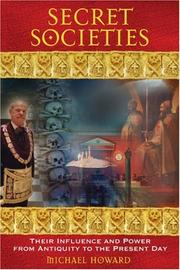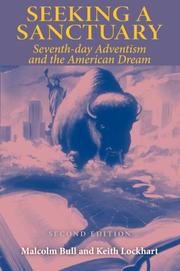| Listing 1 - 8 of 8 |
Sort by
|

ISBN: 9781594772030 Year: 2008 Publisher: Rochester, Vermont Destiny Books
Abstract | Keywords | Export | Availability | Bookmark
 Loading...
Loading...Choose an application
- Reference Manager
- EndNote
- RefWorks (Direct export to RefWorks)
ancient mysteries --- the Templars --- Rosicrucianism --- the American dream --- German nationalism --- Bolshevism --- Nazism --- Occultism --- the Vatican --- politics --- the New World Order
Book
Abstract | Keywords | Export | Availability | Bookmark
 Loading...
Loading...Choose an application
- Reference Manager
- EndNote
- RefWorks (Direct export to RefWorks)
Dissertation
Abstract | Keywords | Export | Availability | Bookmark
 Loading...
Loading...Choose an application
- Reference Manager
- EndNote
- RefWorks (Direct export to RefWorks)
Doelstelling: Deze scriptie is een vertaling van hoofdstuk 9 uit de biografie Lyndon Johnson & the American Dream, aangevuld met een vergelijkende studie van de grammatica van samengestelde zinnen in het Engels en het Nederlands op basis van de vertaalde tekst. Middelen of methode: Het basismateriaal is het boek Lyndon Johnson & the American Dream en de vertaling van hoofdstuk 9, die een deel is van de scriptie. Als theoretisch kader werd vooral een beroep gedaan op vertaalstrategieën zoals beschreven door Brondeel (2001). Resultaten: Er bestaan geen vaste regels voor het vertalen van Engelse samengestelde zinnen in het Nederlands. Bepaalde aspecten van de Engelse taal hebben geen equivalent in het Nederlands en kunnen, afhankelijk van de context en de inbedding van de zin in de tekst, op verschillende manieren vertaald worden.
Book
ISBN: 9780713999020 Year: 2009 Publisher: London Allen Lane
Abstract | Keywords | Export | Availability | Bookmark
 Loading...
Loading...Choose an application
- Reference Manager
- EndNote
- RefWorks (Direct export to RefWorks)
God --- religion --- faith --- globalization --- atheism --- America --- Europe --- religion and politics --- the American Dream --- capitalism --- economy and religion --- religion and materialism --- holy writings --- religion and war --- religious history
Book
ISBN: 9781612195087 Year: 2016 Publisher: Brooklyn, NY Melville House Publishing
Abstract | Keywords | Export | Availability | Bookmark
 Loading...
Loading...Choose an application
- Reference Manager
- EndNote
- RefWorks (Direct export to RefWorks)
faith --- nation building --- free will --- free market --- business --- liberalism --- the end of history --- capitalism --- USA --- the American dream --- christianity --- protestantism --- American religion --- money
Book
ISBN: 1501754688 Year: 2021 Publisher: New York : Cornell University Press,
Abstract | Keywords | Export | Availability | Bookmark
 Loading...
Loading...Choose an application
- Reference Manager
- EndNote
- RefWorks (Direct export to RefWorks)
This text invites us to question the American Dream. Did you earn what you have? Did everyone else? The American Dream is built on the idea that Americans end up roughly where we deserve to be in our working lives based on our efforts & abilities; in other words, the United States is supposed to be a meritocracy. When Americans think & talk about our lives, we grapple with this idea, asking how a person got to where he or she is & whether he or she earned it. This book tries to find out how we answer those questions. It investigates how we think about whether an individual deserves an opportunity, job, termination, paycheck, or fortune. The book looks into the fabric of American life to explore how various people, including dairy farmers, police officers, dancers, teachers, computer technicians, students, store clerks, the unemployed, homemakers, & even drug dealers got to where they are today & whether they earned it.

ISBN: 0253218683 9780253218681 Year: 2007 Publisher: Bloomington Indianapolis Indiana University Press
Abstract | Keywords | Export | Availability | Bookmark
 Loading...
Loading...Choose an application
- Reference Manager
- EndNote
- RefWorks (Direct export to RefWorks)
Seventh-Day Adventists --- United States --- Adventists --- Doctrines --- Adventist theology --- the end of the world --- the divine realm --- the human condition --- the development of Adventist theology --- the American Dream --- society --- the politics of liberty --- ethics --- Adventism and America --- Adventist subculture --- gender --- race --- ministry --- medicine --- education
Book
ISBN: 0520273753 0520953428 1283860309 9780520953420 9780520273757 9781283860307 Year: 2013 Publisher: Berkeley
Abstract | Keywords | Export | Availability | Bookmark
 Loading...
Loading...Choose an application
- Reference Manager
- EndNote
- RefWorks (Direct export to RefWorks)
Building Home is an innovative biography that weaves together three engrossing stories. It is one part corporate and industrial history, using the evolution of mortgage finance as a way to understand larger dynamics in the nation's political economy. It is another part urban history, since the extraordinary success of the savings and loan business in Los Angeles reflects much of the cultural and economic history of Southern California. Finally, it is a personal story, a biography of one of the nation's most successful entrepreneurs of the managed economy -Howard Fieldstad Ahmanson. Eric John Abrahamson deftly connects these three strands as he chronicles Ahmanson's rise against the background of the postwar housing boom and the growth of L.A. during the same period. As a sun-tanned yachtsman and a cigar-smoking financier, the Omaha-born Ahmanson was both unique and representative of many of the business leaders of his era. He did not control a vast infrastructure like a railroad or an electrical utility. Nor did he build his wealth by pulling the financial levers that made possible these great corporate endeavors. Instead, he made a fortune by enabling the middle-class American dream. With his great wealth, he contributed substantially to the expansion of the cultural institutions in L.A. As we struggle to understand the current mortgage-led financial crisis, Ahmanson's life offers powerful insights into an era when the widespread hope of homeownership was just beginning to take shape.
Mortgage loans --- Savings and loan associations --- American Dream --- Idealism, American --- Materialism --- Success --- Building and loan associations --- Building societies --- Cooperative building associations --- Depository institutions --- Loan associations --- Provident loan associations --- S and L's --- Thrift institutions --- Home loans --- Mortgage lending --- Real estate loans --- Loans --- Secondary mortgage market --- History --- Ahmanson, Howard F. --- E-books --- 20th century america. --- biographical. --- book club books. --- books for history lovers. --- building your own company. --- california history. --- chronicles ahmanson. --- discussion books. --- entrepreneurship. --- history of the american dream. --- history of western united states. --- history. --- how to manage a business. --- how to start a business. --- howard ahmanson. --- industrial history. --- leisure reads. --- managed economy. --- political economy. --- risk management. --- southern california. --- success in postwar america. --- successful entrepreneurs. --- urban history. --- vacation books.
| Listing 1 - 8 of 8 |
Sort by
|

 Search
Search Feedback
Feedback About UniCat
About UniCat  Help
Help News
News